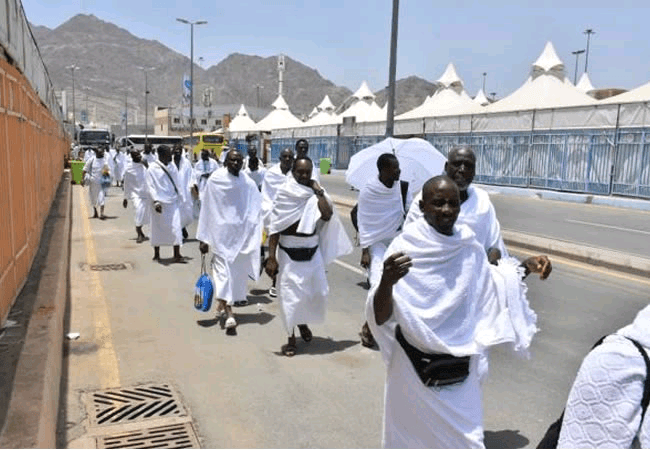By Shafii Sani Mohammed
A new chapter in Nigeria’s religious and aviation history was written on Friday as the Sam Mbakwe International Cargo Airport in Owerri, Imo State, hosted the first-ever Hajj inaugural flight from the South-East and South-South regions of Nigeria.
The symbolic flag-off marked the official commencement of the 2025 Hajj airlift and firmly positioned Imo State on the national pilgrimage map.
For decades, thousands of Muslim faithful from Nigeria’s southern belt undertook tedious journeys to other departure points in Port-Harcourt, Lagos and at times as far as to northen departure centers for the pilgrimage to Makkah. That tide turned in Owerri this week as 240 pilgrims from Imo and Abia States became the pioneers of what is now being celebrated as a transformational moment in Nigeria’s Hajj operations.
The significance of the event was evident with the presence of key dignitaries including Vice President Kashim Shettima, GCON, His Eminence, the Sultan of Sokoto, Alhaji Muhammadu Sa’ad Abubakar III, Governor Hope Uzodimma of Imo State, Chairmen of the Senate and House Committees on Hajj Affairs, and the Chairman/CEO of the National Hajj Commission of Nigeria (NAHCON), Professor Abdullahi Saleh Usman.
In his speech, NAHCON Chairman Professor Abdullahi Saleh Usman described the moment as “historic and spiritually fulfilling,” emphasizing the Commission’s commitment to inclusiveness and ease of access for pilgrims across Nigeria.
“This event is remarkable because it is the first ever Hajj inaugural flight to take off from this region,” Professor Usman said. He described the occasion as a symbol of national unity and proves the religious harmony Governor Uzodimma is fostering in Imo State.
What made the moment even more poignant was that Imo State is a predominantly Christian state, and Governor Hope Uzodimma himself is a devout Christian. Yet under his leadership, the state has emerged as a model of religious tolerance, inclusiveness, and mutual respect.
Governor Uzodimma’s decision to host the national flag-off of the Hajj flight reflects an administration that transcends religious divides and promotes a vision of unity. “That this maiden flight is for Hajj also highlights our identity as a state that embraces diversity,” he said in his address. “Next month, Christian pilgrims will also depart for the Holy Land from this same airport, underlining our shared values of faith and unity.”
This spirit of openness is characteristic of Imo itself—a lush, green, and culturally vibrant state in Nigeria’s South-East, known for its rich history, industrious citizens, and intellectual traditions. Owerri, the state capital, often called the “Eastern Heartland,” offers a welcoming environment with modern infrastructure and a legacy of communal cooperation.
Governor Uzodimma described the airlift as quiet a moment of pride and reaffirmed Imo’s position as a beacon of peaceful coexistence. He recounted how the Sam Mbakwe Airport was built over four decades ago through collective effort and how his administration has transformed it into a functional international hub.
Strategic upgrades—such as a refurbished runway, installation of night-landing equipment, strengthened aviation security, and the construction of Bola Tinubu Drive—have now made it a viable point of international departure. He emphasized that the event would serve as an economic and social turning point for the state.
Vice President Kashim Shettima, in his address titled Pilgrims of Purpose, called on both pilgrims and officials to uphold discipline, integrity, and national pride throughout the Hajj operation.
“You are more than spiritual travellers. You are ambassadors of Nigeria,” he told the pilgrims, urging them to embody the nation’s values and respect all rules laid down by both Nigerian and Saudi authorities.
He extended President Tinubu’s goodwill, praising the NAHCON leadership for effective coordination and commending Governor Uzodimma for his inclusive governance.
As the Owerri flight took off, other departure points across the country also launched their first 2025 Hajj operations. On Day One, a total of four flights departed from various parts of the country—Bauchi, Kebbi, Owerri, and Lagos—successfully airlifting 1,622 pilgrims and officials to the Kingdom of Saudi Arabia.
The smooth coordination of these initial flights signals NAHCON’s commitment to completing the entire airlift within two weeks, as earlier pledged by the Commission’s leadership.
The inaugural flight from Owerri was more than a logistical triumph; it was a statement of national cohesion, faith in action, and governance with vision. It gave Southern Nigerian Muslims a sense of belonging and opened a new frontier in Hajj administration in Nigeria.
As the planes ascended into the skies, carrying the hopes, prayers, and dreams of Nigerian pilgrims, they also lifted a nation’s spirit—reminding all of the possibilities born from unity, preparation, and the will to serve.
A new chapter has unfolded in Nigeria’s Hajj story, it is only fitting to extend deep appreciation to Governor Hope Uzodimma—not only for hosting this national milestone, but for embodying the values of religious and tribal tolerance, inclusivity, and good governance. No wonder the support and admiration he continues to receive from the people of Imo State.
His leadership stands as a shining example of how diversity, when embraced with sincerity, can serve as a bridge to unity and progress. It is also evident in the overwhelming.
Shafii Sani Mohammed writes from the Information and Division of NAHCON.
